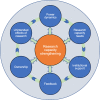'We always find things to learn from.' Lessons from the implementation of the global maternal sepsis study on research capacity: a qualitative study
- PMID: 33685446
- PMCID: PMC7938552
- DOI: 10.1186/s12913-021-06195-9
'We always find things to learn from.' Lessons from the implementation of the global maternal sepsis study on research capacity: a qualitative study
Abstract
Background: Research capacity strengthening could be an indirect outcome of implementing a research project. The objective of this study was to explore the ability of the global maternal sepsis study (GLOSS), implemented in 52 countries, to develop and strengthen sexual and reproductive health research capacity of local participants in low- and middle- income participating countries.
Methods: We carried out a qualitative study employing grounded theory in sixteen countries in Africa and Latin America. We used inductive and deductive methods through a focus group discussion and semi-structured interviews for the emergence of themes. Participants of the focus group discussion (n = 8) were GLOSS principal investigators (PIs) in Latin America. Interviewees (n = 63) were selected by the country GLOSS PIs in both Africa and Latin America, and included a diverse sample of participants involved in different aspects of study implementation. Eighty-two percent of the participants were health workers. We developed a conceptual framework that took into consideration data obtained from the focus group and refined it based on data from the interviews.
Results: Six themes emerged from the data analysis: recognized need for research capacity, unintended effects of participating in research, perceived ownership and linkage with the research study, being just data collectors, belonging to an institution that supports and fosters research, and presenting study results back to study implementers. Research capacity strengthening needs were consistently highlighted including involvement in protocol development, training and technical support, data analysis, and project management. The need for institutional support for researchers to conduct research was also emphasised.
Conclusion: This study suggests that research capacity strengthening of local researchers was an unintentional outcome of the large multi-country study on maternal sepsis. However, for sustainable research capacity to be built, study coordinators and funders need to deliberately plan for it, addressing needs at both the individual and institutional level.
Keywords: Maternal infection; Maternal sepsis; Multi-country study; Qualitative research; Research capacity strengthening; Sexual and reproductive health.
Conflict of interest statement
MB and VB were involved with the global maternal sepsis study (GLOSS) development and implementation, as well as analysis of results; SK and AB were regional coordinators of GLOSS for Francophone Africa. Authors declare no other competing interests.
Figures
Similar articles
-
Factors influencing awareness of healthcare providers on maternal sepsis: a mixed-methods approach.BMC Public Health. 2019 Jun 3;19(1):683. doi: 10.1186/s12889-019-6920-0. BMC Public Health. 2019. PMID: 31159751 Free PMC article.
-
Qualitative Study.2022 Sep 18. In: StatPearls [Internet]. Treasure Island (FL): StatPearls Publishing; 2025 Jan–. 2022 Sep 18. In: StatPearls [Internet]. Treasure Island (FL): StatPearls Publishing; 2025 Jan–. PMID: 29262162 Free Books & Documents.
-
Folic acid supplementation and malaria susceptibility and severity among people taking antifolate antimalarial drugs in endemic areas.Cochrane Database Syst Rev. 2022 Feb 1;2(2022):CD014217. doi: 10.1002/14651858.CD014217. Cochrane Database Syst Rev. 2022. PMID: 36321557 Free PMC article.
-
Evaluating implementation of the World Health Organization's Strategic Approach to strengthening sexual and reproductive health policies and programs to address unintended pregnancy and unsafe abortion.Reprod Health. 2017 Nov 21;14(1):153. doi: 10.1186/s12978-017-0405-3. Reprod Health. 2017. PMID: 29157274 Free PMC article.
-
Research capacity strengthening for sexual and reproductive health: a case study from Latin America.Reprod Health. 2017 Mar 7;14(1):35. doi: 10.1186/s12978-016-0222-0. Reprod Health. 2017. PMID: 28270214 Free PMC article. Review.
Cited by
-
Sexual and reproductive health research capacity strengthening programs in low- and middle-income countries: A scoping review.PLOS Glob Public Health. 2024 Oct 3;4(10):e0003789. doi: 10.1371/journal.pgph.0003789. eCollection 2024. PLOS Glob Public Health. 2024. PMID: 39361709 Free PMC article.
-
Research capacity strengthening methods and meanings: negotiating power in a global health programme on violence against women.BMJ Glob Health. 2024 Dec 11;9(12):e015376. doi: 10.1136/bmjgh-2024-015376. BMJ Glob Health. 2024. PMID: 39663123 Free PMC article.
-
Embedding research capacity strengthening in multi-country studies in low-and middle-income countries: learnings from sexual and reproductive health research.Glob Health Action. 2024 Dec 31;17(1):2338634. doi: 10.1080/16549716.2024.2338634. Epub 2024 Apr 12. Glob Health Action. 2024. PMID: 38607331 Free PMC article. Review.
References
-
- World Health Organization . Research for universal health coverage. Geneva: World Health Organization; 2013. p. 146.
-
- World Health Organization . Report from the ministerial summit on Health Research: identify challenges, inform actions, correct inequities. Mexico City: World Health Organization; 2005.
-
- ESSENCE on Health Research . Planning, monitoring and evaluation: framework for research capacity strengthening. Geneva: WHO; 2016.
MeSH terms
Grants and funding
LinkOut - more resources
Full Text Sources
Other Literature Sources
Medical


